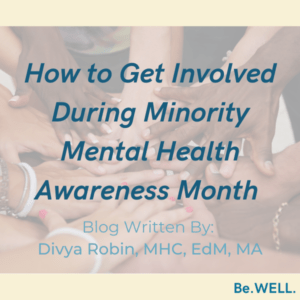July is dedicated to bringing awareness to the importance of mental health and how to uniquely support people’s mental health needs based on the community they come from. This month recognizes the struggles that underrepresented groups face when seeking mental health care in the United States. In addition, it is to bring awareness of how mental health is viewed in different cultures, which is not the same as white American culture. Here are ways that you can get involved in Minority Mental Health Month.
- Download Mental Health America’s BIPOC (Black, Indigenous, People of Color) toolkit created for the month of July. This toolkit includes resources for underrepresented communities, handouts on racism and racial trauma, information on how to make a difference, and a screening tool to help guide you in conversations with people about mental health. Find the toolkit here. When looking at mental health statistics, it is important to make sure that it is coming from a reputable source. NAMI (National Alliance on Mental Illness) and MHA (Mental Health America) are great resources to learn about how you can make an impact on the current mental health movement.
- Take the time to learn more about the minority mental health experience. Have conversations with those around you and actively listen to their experience. You can also sign up for webinars, listen to podcasts, read articles, and look on social media with the #minoritymentalhealthmonth hashtag for more information. For the month of July, BeREAL is featuring #minoritymentalhealthadvocates who narrate their experience of mental health care, treatment, and how to make a substantial difference.
- Reflect on your biases and how your mental health experience might contrast those from minority communities. Findings from the National Institute of Mental Health and Health Disparities Program show that members of racial and ethnic communities are less likely to have access to mental health services, less likely to use community mental health services, and are more likely to receive lower-quality care.
- Work toward forming a culturally competent healthcare system. A large reason that people from underrepresented communities do not seek mental health treatment is due to a culturally homogenous mental healthcare system and racism, bias, and discrimination in treatment settings. Many treatment providers do not consider how cultural differences play a role in one’s life, presentation of illness, and traditions of healing within one’s culture. Attend workshops, webinars, and learn about how to improve the healthcare system to foster more inclusivity.
- Watch NAMI’s (National Alliance on Mental Illness) ‘Strength Over Silence’ documentary series. This ongoing series highlights perspectives on mental health across backgrounds and communities. It features real stories and lived experiences, emphasizing the importance of culture and identity in the mental health movement. Learn more about how to make a difference, other’s experiences, and how to support those from underrepresented communities during this shift in mental health. The best way to learn about how to uplift someone is to listen to their experience with empathy. This docuseries is a wonderful way for viewers to understand the minority mental health experience and how they can play a role in the movement.



